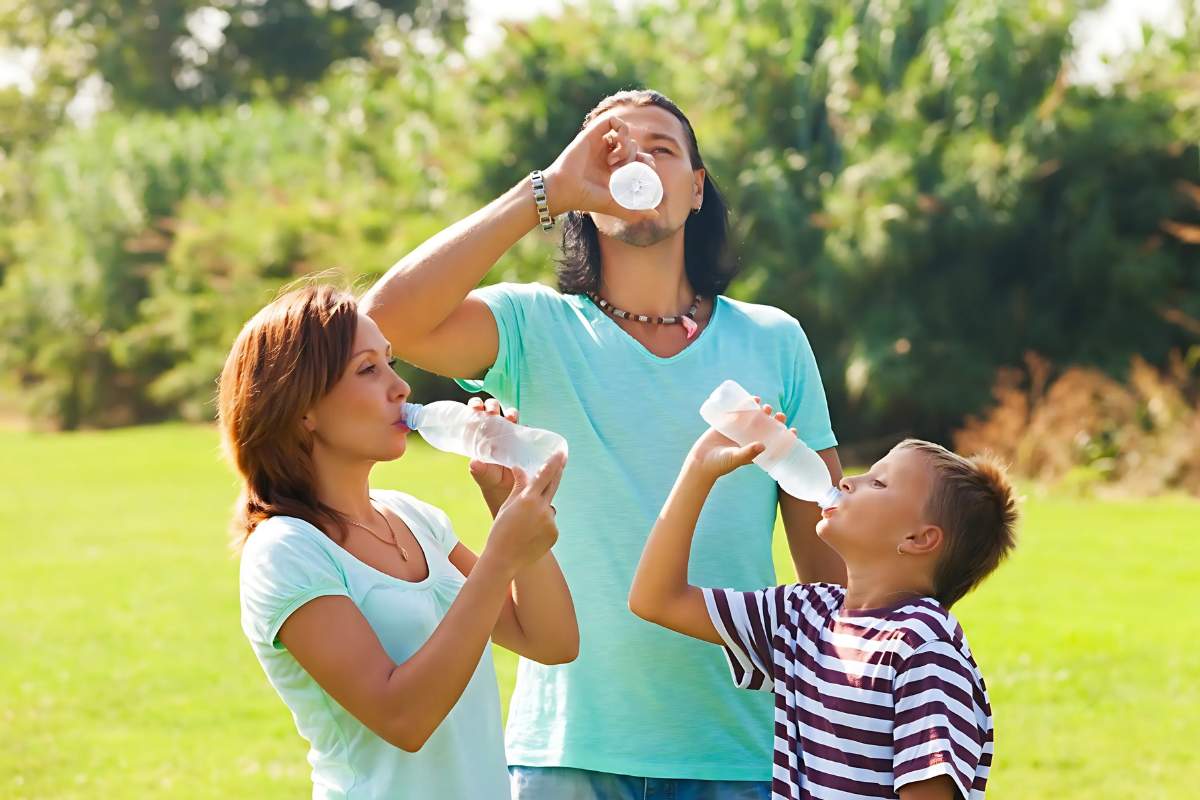Ever felt like you’re running on fumes? Like you’ve been dragging through the day, wondering why your energy’s flat? Believe it or not, your body might be waving a big, thirsty red flag. Dehydration isn’t just about a dry mouth; it sneaks up on you, sabotaging everything from your brainpower to your skin’s glow. So, let’s spill the beans on how water deficiency can trip you up, and (bonus) explore some natural remedies that actually work.
Why Water Matters: Your Body’s Invisible Lifeline
Picture this. Your body is like a sponge, mostly water, squishy and ready to absorb, transport, and flush out what you don’t need. Every cell, tissue, and organ leans on H₂O to:
- Transport nutrients. Think of blood as the delivery truck; without enough fluid, you’re looking at slow service.
- Regulate temperature. Sweat isn’t just gross, it’s your built‑in air‑conditioning.
- Flush toxins. Kidneys, liver: they rely on a steady stream of water to keep things squeaky‑clean.
- Cushion joints. Cartilage loves hydration. Without it, ouch.
Funny thing is, we take all that for granted… until it stops working. Then we wonder, “What the heck happened?”
Early Warning Signals, Your Body’s Subtle SOS
Dehydration doesn’t always hit you with a neon sign. Sometimes it’s more like a tiny whisper:
1. Persistent Thirst (Kind of a No‑Brainer)
“But I’m thirsty, I always forget to drink!” Sound familiar? That classic parched‑tongue feeling is your body’s first alarm. And yet, many of us shrug it off.
- Tip: Keep a water bottle within arm’s reach, your future self will thank you.
2. Dark, Scanty Urine (Gross but True)
Bright yellow or amber? Not great. Clear or light straw? That’s the sweet spot.
- Quick check: Midday restroom visit, peek at the color. Adjustment might be needed.
3. Headaches and Brain Fog
Ever notice how a headache sometimes fades after guzzling water? That’s no coincidence. When your brain shrinks, yes, it literally loses volume; it tugs on the meninges (that’s your brain’s protective covering), causing pain.
- Pro tip: Sip steadily; avoid guzzling, which can overwhelm your system.
4. Fatigue and Low Energy
Here’s the kicker: even mild dehydration (just 1–2% body weight in fluid loss) can zap your energy and mood. You might feel sluggish, demotivated, like every step is wading through molasses.
- Don’t blame the 3 p.m. slump entirely on your coffee habit.
When Symptoms Escalate, Dehydration Goes Deeper
Ignore those early cues, and dehydration can morph into something more serious. We’re talking “let’s get you to the ER” territory. But hey, no need to panic, knowledge is power.
1. Dizziness and Lightheadedness
Stand up too quickly? The world spins. That’s orthostatic hypotension, blood pressure dropping because there’s less fluid circulating.
- Safety first: Rise slowly, hold onto something stable.
2. Dry Skin and Chapped Lips
Ever tried the fancy hydrating serums? They help, sure, but if you’re not hydrated from the inside, topical creams are just lipstick on a pig.
- Natural hack: Munch on hydrating fruits (watermelon, cucumber). More on that later.
3. Muscle Cramps and Joint Pain
Your muscles and joints work like well‑oiled machines, minus the oil if you’re dehydrated. That leads to painful cramps and those achy joints that make you groan.
- Fuel fix: Electrolytes matter. But you don’t need the sugar‑bomb sports drinks.
4. Rapid Heartbeat and Breathing
Your heart works overtime to circulate thicker blood. You might notice it pounding or racing, even when you’re just chilling on the couch. Weird, right?
Your Body Under the Microscope: What Happens

Let’s get nerdy for a sec (but fun).
- Blood Volume Shrinks. Less plasma means thicker blood.
- Reduced Oxygen Delivery. Your cells gasp for O₂; performance drops.
- Metabolism Slows. Chemical reactions need water; think of enzymes as tiny workers who can’t do their job without a drink.
- Heat Tolerance Drops. Expect sunburns or heat exhaustion faster.
By the time you feel seriously ill… dehydration’s already wreaked havoc.
Common Questions, Answered with, Well, H₂O
How Much Water Should I Drink?
“Eight glasses a day” is the classic line. But, the plot twist, it depends on you. Body size, activity level, climate, diet (coffee & booze = diuretics)… all factor in.
- General guideline: Aim for about 30–35 ml per kg of body weight. For a 60 kg person, that’s roughly 1.8–2.1 liters daily.
- Adjust if: You exercise, live in a hot climate, or consume a lot of caffeinated beverages.
Can I Count Coffee, Tea, and Juices?
Kind of, yes, but with caveats:
- Coffee & Tea: They hydrate, but too much caffeine can make you pee more. Balance is key.
- Juices: Good for flavor, but often high in sugar. Best as an occasional treat.
What About Electrolyte Drinks?
You need sodium, potassium, and magnesium, but most commercial sports drinks are loaded with sugar and artificial junk. Consider natural alternatives:
- Coconut water. Nature’s Gatorade. (And yes, you’ll love this.)
- Homemade electrolyte water: Stir a pinch of sea salt and a splash of lemon juice into water.
Will Eating Water‑Rich Foods Help?
Absolutely. Fruits and veggies can pad your hydration stats:
| Food | Water Content (%) |
| Watermelon | 92% |
| Cucumber | 96% |
| Strawberries | 91% |
| Lettuce | 95% |
| Celery | 95% |
Rule of thumb: Fill half your plate with produce. Easy.
Natural Remedies, Beyond Plain Water
Okay, plain water’s stellar. But let’s spice things up, shall we?
1. Cucumber + Mint Infusion
Slice a cucumber, toss in a few mint leaves, and steep in cold water overnight. Refreshing. Feels like spa life, even if you’re just at your desk.
2. Coconut Water Cooler
Straight from the green coconut (if you can snag one). Natural electrolytes, mild sweetness, no artificial nonsense. If fresh isn’t an option, pick brands with only coconut water, no added sugar.
3. Herbal Teas (Iced or Warm)
Chamomile, hibiscus, rooibos… all count. Plus, certain herbs (like ginger) can aid digestion and reduce inflammation.
- Note: Watch the caffeine content, opt for caffeine‑free if hydrating is your main goal.
4. Fruit‑Infused Ice Cubes
Freeze berries, citrus slices, or melon chunks in ice cube trays filled with water. Pop a few into your glass, a funky, fun flavor boost.
Making Hydration a Habit
Here’s where the rubber meets the road. You know the why; now let’s nail the how.
1. Set Reminders (Kind of a Nudge)
Use your phone’s notification feature or apps like WaterMinder. Gentle ping, then sip.
2. Upgrade Your Bottle
Go for a reusable water bottle you like. Stainless steel, glass, neon colors, choose your vibe.
- Insulated helps if you prefer your water icy cold.
3. Pair Drinking with Routine Tasks
Brush your teeth? Take a few gulps. Finish a meeting? Time for a refill break.
- Micro‑habits add up big time.
4. Track with a Journal
Bullet journal, message thread, whatever. Jot down each glass. Holds you accountable, and you feel accomplished.
When to Seek Professional Help
Severe dehydration can spiral. Look out for:
- Confusion, irritability (especially in older adults).
- Rapid heartbeat, rapid breathing.
- No pee for eight hours, extreme dizziness.
In such cases, medical fluids (oral rehydration solutions or IV fluids) might be necessary. Don’t beat around the bush; get help.
The Takeaway, Sip, Smile, Repeat
Water, simple, yet so powerful. Neglect it, and your body throws curveballs: headaches, fatigue, dry skin, even cognitive dips. Pay attention to the subtle cues. Drink steadily. Embrace natural infusions. And turn hydration into a habit, not a hassle.
Here’s the bottom line: Your body, miraculous, dependable, downright amazing, needs fluid to function. Treat it kindly, one sip at a time. Give it what it craves, and watch how everything clicks back into place. Trust me, your future energized self will high‑five you… In spirit, anyway.
Give it a try! Keep that bottle close. Be kind. Stay curious. And above all, drink up. Your body’s counting on you






















